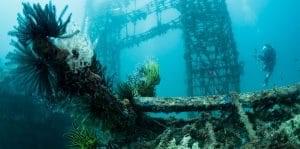
As most of you probably know, we are at a critical impasse in the world with climate change. The human impact on nature has had devastating worldwide effects that seem only to be getting worse. I was somewhat expecting this documentary to be an air horn of warning about how we worthless humans have destroyed the oceans, and I was ready. I was ready to be depressed and angry when it was over.
Surprisingly, Rigs 2 Reefs: Transsecting Borneo, has something rare to offer in comparison to most environmental documentaries coming out these days; hope. Marine conservation scientists Amber Jackson and Emily Callahan co-founded Rigs 2 Reefs Explorations to do something that I would’ve never even considered possible. All 2,179 active oil rigs in the world’s oceans do have a positive impact on the environment. I know you’re probably like…uhhhh, noooo. Which is what I would’ve thought before I saw this film.
Most oil rigs that have been around for a certain number of years end up forming underwater ecosystems which mimic natural reefs. All sorts of ocean life flock to the makeshift reefs, making the ocean life much healthier than in the surrounding areas. Jackson and Callahan’s hopes are to turn decommissioned oil rigs into ecotourism resorts. They visit Borneo’s Seaventures Dive Resort which is the first former oil rig to function as a tourist destination.

“All 2,179 active oil rigs in the world’s oceans do have a positive impact on the environment…”
Jackson and Callahan travel with director Scott Splorderor, cameraman Kyle McBurnie and Emily’s Dad, Kevin, who is also a marine scientist. Their goal is to collect data from the Seaventure reef on camera, as well as visit other reefs in the area. Once they are there, they transsect the area. What is transsecting? I didn’t know what it was before I saw this documentary either, but basically it is sectioning off areas of a reef and recording all forms of ocean life within the section. It might sound simple enough, but you find by watching that it is exhausting even for expert divers to spend that much time underwater.
They also visit the neighboring island of Mabul, which is an excellent contrast to the resort where the team was staying. Incredibly poor people live in shacks that stretch out into the sea. They have made their living off of the water for years and years. The people who inhabit the island are called Baja Laut which roughly translates to “sea gypsies”, which I don’t know how I feel about that terminology, but that’s a story for another time. We see that due to the lack of waste disposal systems on the island, the water is filled with trash. However, the youth of the island are being taught by European scientists the importance of recycling and ecological preservation. There’s a turtle hatchery, and we get to see baby sea turtles run out to the ocean!

“…learning about the possibilities for an environmentally sustainable future for our oceans.”
There are two more dives, one at Sipadan, a protected reef off the coast of Malaysia and another one at Holly, an oil rig in Santa Barbara that is about to be decommissioned. After compiling the statistical data, Jackson and Callahan discover that the oil rig reefs support more forms of ocean life. Their mission is to convince the state of California to convert Holly into an eco-resort similar to Seaventures.
This film is short, only 37 minutes, and is more of a call to action than anything else. I enjoyed learning about the possibilities for an environmentally sustainable future for our oceans. Even if I think the scientist’s point of view of working with the oil companies instead of against them is too forgiving of all the damage that Big Oil has caused in our world both ecologically and politically. However, in our current reality, it is probably the best solution.
Rigs 2 Reefs: Transsecting Borneo (2018) Directed by Scott Splorderor. Starring Amber Jackson, Emily Callahan, Kyle McBurnie, Kevin Callahan.
7 out of 10 Stars

